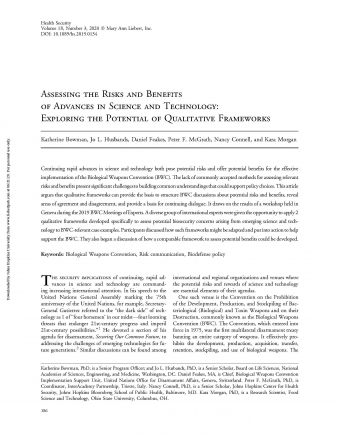Biotechnology & Biosecurity
Publication
Assessing the Risks and Benefits of Advances in Science and Technology: Exploring the Potential of Qualitative Frameworks
, Health Security Vol. 18, No. 3. Special Feature: Risk Assessment
Leading authoring institution
AUTHORS
Katherine Bowman,
Jo Husbands,
Daniel Feakes,
Peter McGrath ,
Nancy Connell,
Kara Morgan
Language
English
Pages
9
DOI
http://doi.org/10.1089/hs.2019.0134

